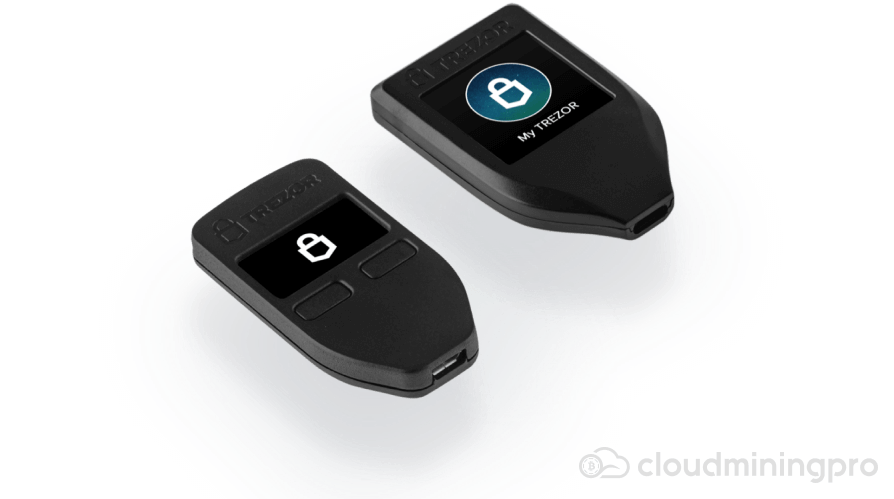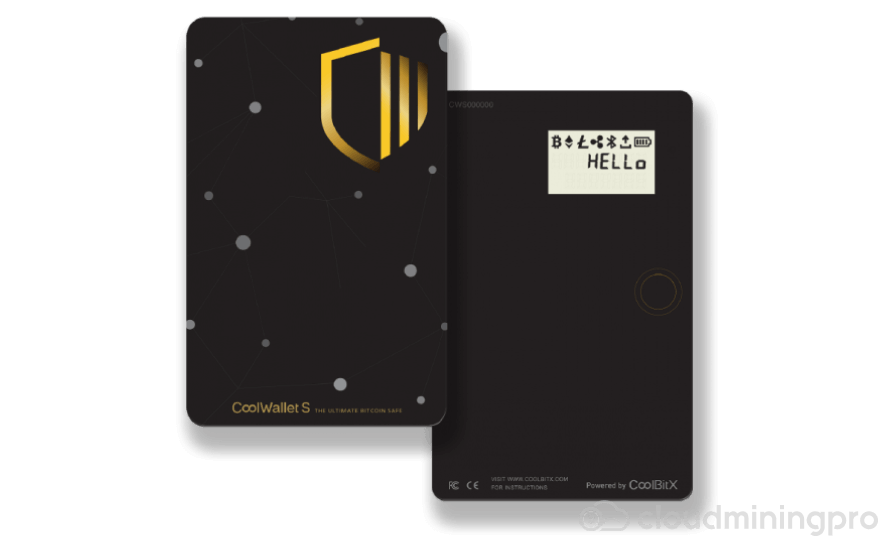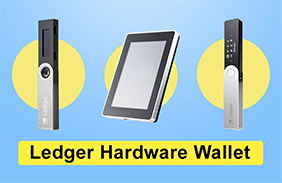General Overview: What are Cryptocurrency Wallets?


Cryptocurrency wallets are storage systems set up to store crypto assets. It consists of physical devices, online platforms designed to help users keep, send, receive, and track cryptocurrency transactions. There’s a lot of semblance between fiat and cryptocurrency systems. Fiat currencies, i.e. Dollars, Euros, Yen, etc. are stored in banks, and each account is identified with a number. In the same vein, cryptocurrencies are identified with private and public keys.
Private Key is a 256-bit number identified with a profile with which the owner has access to the wallet. Usually 64 characters long, it should be kept private and can be saved on computer files or written on paper. On the other hand, public keys is an address known to everyone used to receive funds into a wallet. Both keys are associated with each cryptocurrency wallet and are connected to the blockchain. The blockchain is a digital ledger on which cryptocurrency transactions are recorded.
It is important to note that when tokens are sent from one wallet to another, it is not in the wallet. The wallet is just used to identify cryptocurrency assets with different portfolios. The asset itself is stored on the blockchain. Cryptocurrency wallets exist in various forms, as explained below.
Different types of Wallets/Ways to Store Cryptocurrency
The cryptocurrency ecosystem has evolved over the last few years, and the ways to store assets have increased. There are two primary forms of wallet for cryptocurrency, i.e. Physical and Online Wallets.
Physical Wallets
These wallets are also referred to as Cold Wallets. They provide physical means of storage in two forms namely;
Paper Wallet
This method of storing cryptocurrencies involves printing out the private keys and QR code of a wallet on paper. The paper wallet was popular in Bitcoin’s early days; however, it has a lot of downsides and regarded unsafe. One of such is that user private keys are publicly exposed since many printers have internal storage for storing files. Also, paper wallets promote address reuse while hierarchical deterministic wallets automatically generate a new address, thus ensuring security.
Hardware Wallet
These are physical storage systems that store user information on a hardware device, i.e. USB. Examples of popular hardware wallets are Ledger Nano S, Ledger Nano X, Trezor One, etc. A cryptocurrency hardware wallet is regarded as the most secure method of storing assets. It is safe from a hack and easy to use.
Software Wallets
These are the computer or mobile-based wallets. They exist in various forms namely;
Bitcoin Clients
They are referred to as the original Bitcoin wallets used by the currencies pioneers and early adopters. The first-ever built Bitcoin client is BitcoinQt. Example of other notable Bitcoin clients includes Electrum, Blocktrail, etc.
Mobile Wallets
These wallets are available for use on various smartphones, i.e. Android, iPhone, iPad, etc. You can easily manage your cryptocurrency portfolio by downloading the mobile application from the respective app stores. They are usually smaller in size compared to desktop wallets. Examples of mobile wallets are Mycelium, Coinomi, etc.
Desktop Wallets
This class of wallet works with PCs. Top desktop wallets include Electrum, Atomic Wallet, Bitcoin Core, etc. Ledger Live is a desktop wallet; however, you must own a Ledger device, i.e. Nano S or Nano X, to use the application. For more help on choosing the right wallet for your computer, visit here.
Exchanges
This is most popular of all online wallets because many crypto-asset owners engage in cryptocurrency trades on trading platforms. They have an inbuilt crypto wallet, which allows it to make trades easily. Notable exchanges used for crypto trading includes Bittrex, CoinExchange, Bitmex, Binance, Poloniex, Coinbase, etc.
Which is better? Physical Wallets or Software Wallets?
Physical and software wallets are excellent ways to store crypto assets. However, they have their advantages and disadvantages. To discuss which is best between, it is essential we discuss and understand its pros and cons.

Pros and cons of Physical Wallets
| Pros | |
|---|---|
| Secured Private Keys: | Physical wallets provide adequate security for private keys since it is not connected to the internet. Most hardware wallets, including Ledger and Trezor private keys, are protected within a secure element. Also, paper wallet ensured security since private keys are printed on paper which can be kept safe. |
| Encryption: | Physical wallets have extra security layers for the utmost protection of crypto assets. Popular hardware wallets, i.e. provides PIN Code and passphrase support for users. Ledger wallets, in particular, are certified secure by ANSSI, a French cybersecurity agency. Also, Bitbox wallet uses 256-bit encryption and two-factor authentication to improve security. |
| Support for Multiple Cryptocurrencies: | Hardware wallets supports many crypto assets. For instance, Ledger supports over 1100 crypto assets, including ERC-20 tokens. |
| Easy to Use: | Cryptocurrency physical wallet is easy to use and carry around. Mostly designed like USB or smartphone-like, you can operate your hardware wallet anywhere. |
| Cons | |
| It is not free: | Unlike online wallets, hardware wallets are sold for a free. |
| Easily Destructible: | Paper Wallets are prone to fires. Also, ledger devices can be easily destroyed when mishandled. Although this doesn’t affect the crypto assets, if the recovery phrase wasn’t properly stored, there is no way to access your crypto portfolio. |
Pros and cons of Software Wallets
| Pros | |
|---|---|
| It is free: | Software wallets are free to use. You can download and install the client application online free of charge. |
| Fast Transactions: | Transactions initiated on software wallets are fast since it is an online wallet. You can easily send cryptocurrencies from one wallet to another. |
| Easy to Setup: | Software wallets are easy to use. You can easily set up a mobile or software wallet by downloading the client application. Its registration process is also easy. In most cases, the required information includes Name, email address and more recently official documents for KYC. With this, you have a wallet to send/receive cryptocurrencies. |
| Recovery: | You can quickly restore user profile with software wallets in case you lose your password or forget access details by contacting the support team. |
| Multi-Platform Availability: | Software wallets are available on multiple platforms, i.e. smartphones and computers. Therefore, you can carry out transactions easily on any device with an internet connection. |
| Cons | |
| Prone to Hack: | Software wallets are easily exposed to hacks. A lot of exchanges have in recent times been hacked with a loss of funds. Therefore, software wallets are unsafe for storing cryptocurrencies. |
Physical Wallet/Software Wallet Comparison: The Conclusion
In comparing both forms of wallets, we have shown that both have their respective strengths and limitations. Therefore, to choose which is better, it depends on how you use crypto. If you’re a regular crypto trader, a software wallet is the most likely option. However, if you’re a HODLer who has a lot of crypto wallets to keep, it is advisable to use hardware wallets such as etc. In general, hardware wallets are better than software wallets due to the increased hack of online wallets on exchanges, e.g. etc. However, to be on the safer side, you can save trading funds and transfer it to your hardware wallet at intervals.
The Top 5 wallets for Cryptocurrency
As adoption increases, a lot of cryptocurrency startups are providing storage systems for crypto assets owners. We have studied the features, pros and cons of all available wallets to be able to compile the best cryptocurrency wallets. The list of cryptocurrency wallets below represents the top crypto wallets.
Ledger
Ledger wallet is a hardware wallet designed by France-based Company, Ledger Inc. Users and top cryptocurrency reviewers repute it as the best crypto wallet due to its significant features and capabilities. Ledger has about four different devices which include the Ledger Wallet Nano, Ledger Blue, Ledger Nano S and Ledger Nano X. The Ledger hardware wallet works on its custom operating system, BOLOS and ensures the protection of user private keys within a secure element. It supports 1100+ cryptocurrencies and ERC-20 tokens, including Bitcoin, Ethereum, Dash, Litecoin, etc.

Its latest wallet, the Ledger Nano X provides Bluetooth support, thus making it compatible with iOS devices. It has a mobile and desktop wallet, i.e. Ledger Live which allows users to manage their transactions on their smartphones and computers easily. It also has a backup and restore feature which will enable users to retrieve their profile in case of wallet theft/loss on another device. That way, you don’t lose your crypto tokens. Ledger is undoubtedly one of the best cryptocurrency wallets in terms of pricing, security, and design. You can buy the wallet via its online shop here.
Proc of Ledger Wallet
Ledger wallet has a lot of benefits, which is why it is the most popular hardware wallet. As of today, over 1 million units of Ledger wallet has been sold by the company. Its advantages are;
| Ease of Use: | The hardware wallet is easy to set up and manage cryptocurrency transactions. It provides recovery sheet to document recovery phrases for easy access to profile on another device. Ledger wallet is designed like a USB device and has a lightweight, which makes it easy to carry about. |
|---|---|
| Security: | The wallet is very secure, using the highest possible form of encryption. It protects user private keys within a secure chip. Every profile is identified with a recovery phrase, and you can set your PIN-code and two-factor authentication feature for additional security. When sending crypto assets from the wallet to another, it ensures double confirmation on both Ledger Live and the device before completing a transaction. |
| Multicurrency Support: | Ledger crypto wallet supports many cryptocurrency assets. It presently supports 1100+ crypto assets. |
| Compatibility with Multiple devices: | It is compatible with smartphones and computers. You can access the Ledger Live application on Android, iOS, Linux, Mac, and Microsoft Windows operating systems. Download the client application here. |
Trezor
Asides Ledger, Trezor is another wallet with excellent security solutions for protecting crypto assets. Launched by SatoshiLabs in August 2014, it is the world’s first Bitcoin hardware wallet. Over the years, the crypto hardware wallet comparison between Ledger & Trezor have increased with both companies releasing new devices with extra features. Trezor hardware wallet currently has two products, namely Trezor Model T and Trezor One. It has an OLED screen and provides support for 1064 currencies, i.e. Ethereum, Litecoin, Bitcoin, Dogecoin, Dash, etc. It also has USB connectivity, which allows you to connect the wallet to your phone or computer. You can manage your cryptocurrency transactions with various apps, i.e. Mycelium, Multibit HD, TREZOR Wallet, etc. To order for your wallet, visit Trezor Shop.

Proc of Trezor Wallet
| Advanced Security: | Trezor wallet provides a 24-word recovery phrase for every profile. It also allows PIN and two-factor authentication to access your crypto portfolio. The wallet offers additional passphrase support as an extra security layer. |
|---|---|
| Excellent Customer Support: | It provides 24/7 fast customer support to attend to user complaints and requests. To contact support, send a mail to [email protected], or you can join the Reddit forum. For additional information, visit here to have access to FAQs and Technical question. |
| Backup/Restore Feature: | You can easily backup your crypto portfolio by writing down the recovery phrase given upon profile creation. The recovery phrase helps to retrieve your Trezor profile if your wallet is stolen, lost or damaged. |
| Extra Screen Protection: | Its casing is ultrasonically welded, thus making it difficult to be restored in the event of a forceful opening. The Trezor bitcoin wallet supports over 1000 cryptocurrencies. |
KeepKey
It is a Hierarchical Deterministic (HD) hardware wallet owned by ShapeShift and launched in 2015. The KeepKey hardware wallet secures user private keys and helps users to protect and store their cryptocurrencies offline. It has a large display and an intuitive web interface which makes it easy to send, receive and track cryptocurrencies. Unlike Trezor and Ledger, KeepKey supports only about 30 cryptocurrencies and 46 ERC-20 tokens. Upon profile creation, it generates a 12-word recovery phrase which can be used to retrieve private keys. KeepKey is compatible with Android smartphones and Linux, Mac, Windows operating systems. It also works with external wallets, i.e. Electrum, MultiBit, Mycelium, etc.

| HD Wallet: | The KeepKey wallet allows users to generate an unlimited number of private keys. |
|---|---|
| Security: | The device is protected using a PIN code. By creating a profile, you have a recovery phrase which allows you to recover your private keys at will. It also has passphrase support. |
| Affordable: | Priced at $79, you can purchase your wallet here. |
| Beautiful Display: | The device has an OLED display, which makes it easy to use. |
Coolwallet
Coolwallet is a Bitcoin hardware wallet which provides secure storage for crypto assets. Developed by CoolBitX, a Taiwan-based Fintech company, it was released in 2016. Coolwallet is a wireless device that is compatible with Android and iOS devices. It has USB connectivity and also connects to smartphones via Bluetooth or NFC. Supported cryptocurrencies include Ripple, Ethereum, ICON, Litecoin, and other ERC-20 tokens. It has only one product available at $99, i.e. CoolWallet S. However, you can also get two wallets at a reduced rate of $159. To set up your CoolWallet, download the User Manual.

| Portability: | The device has a simple and sleek design which makes it portable. |
|---|---|
| Security: | Like other wallets, it provides recovery phrase, PIN code and 2-factor authentication support for wallets. Coolwallet hardware wallet is easy to set up and use. It has USB and Bluetooth connectivity. |
Bitbox
It is a hardware wallet released by Zurich-based cybersecurity company, Shift Devices AG. It offers secure storage for cryptocurrency assets. Bitbox wallet features include a micro SD card, touch button and LED indicator. It ensures encrypted USB communication and is compatible with smartphones and computers. This wallet has TOR compatibility for increased privacy. It supports only a few currencies, namely Bitcoin, Ethereum Classic, Litecoin, Ethereum, and ERC-20 tokens.

| Bitbox hardware wallet is affordable: | It is priced at 44 EUR, visit the website to buy. The wallet is easy to set up and you can backup your user profile on the Micro SD card. It provides substantial security features to ensure that the crypto assets are safe. |
|---|
Conclusion
In this article, we have discussed the various forms of cryptocurrency wallets detailing the strengths and limitations of each of them. We also did a quick overview of the top cryptocurrency wallets available in the market. It was observed that Ledger and Trezor have excellent features to be labelled a secure wallet, making them both the best cryptocurrency wallets. As the ecosystem continues to evolve, it is our best belief that other features would be added to these wallets for excellent user experience.

 assets/images/blog/small_pics/Ledger 282_183.png
assets/images/blog/small_pics/Ledger 282_183.png
 assets/images/blog/small_pics/Ledger nano X 282_183.png
assets/images/blog/small_pics/Ledger nano X 282_183.png
 assets/images/blog/small_pics/ledger nanoS 282_183.png
assets/images/blog/small_pics/ledger nanoS 282_183.png
 assets/images/blog/small_pics/Ledger blue 282_183.png
assets/images/blog/small_pics/Ledger blue 282_183.png